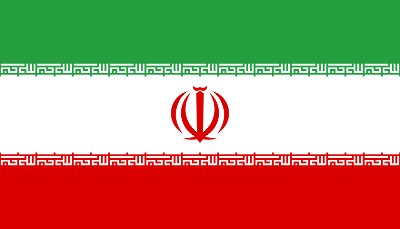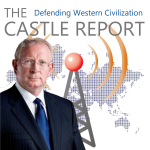Executive
Trump and the Iran Deal

Hello, this is Darrell Castle with today’s Castle Report. Today I will be discussing the decision by President Trump to withdraw the United States from the Joint Comprehensive Plan of Action (JCPOA), better known as the Iran Deal.
Trump denounced the Iran Deal from the beginning
During his Presidential campaign, then candidate Trump said he would not have made the Iran Deal and that it was a bad deal, a very bad deal. So after months of speculation and rumors, President Trump finally pulled the plug on the deal. He announced the U.S. withdrawal from the deal on May 8, citing concerns that the Joint Comprehensive Plan was not comprehensive enough and did not address Iran’s destabilizing efforts in the Middle East Region.
In his speech announcing withdrawal, the President said that a more constructive deal could have been struck at the time but wasn’t.
At the heart of the Iran Deal was a giant fiction: that a murderous regime desired only a peaceful nuclear energy program. Today, we have definitive proof that the Iranian promise was a lie.
Intelligence information provided by Israel was cited for proof of the lie. He said that after the deal was struck and the sanctions lifted, Iran used its new money to build its nuclear capable missiles, support terrorism, and cause havoc throughout the Middle East and beyond. The deal was so poorly negotiated, he said, that Iran would be close to a nuclear breakout even if it fully complied.
What Trump will do next
The President, in his speech was apparently saying, look, this was a very bad deal for us and I am therefore canceling our participation in it. The deal would not prevent Iran from developing a nuclear bomb and threatening American cities. Interestingly, there was no accusation that Iran was not in compliance with the deal, only that it was bad for America.
The President further announced that he would sign a presidential memorandum to begin reinstating US sanctions on the Iranian regime.
We will be instituting the highest level of economic sanction. Any nation that helps Iran in its quest for nuclear weapons could also be strongly sanctioned by the United States.
Regime change in Iran?
What does all this mean? Is the end of the deal a good thing or a bad thing? I will confess that is a very good question and one in which the answer is not very clear at all. Some of what the President intends for it to accomplish can be found in the closing paragraphs of his speech.
It has now been almost 40 years since this dictatorship seized power and took a proud nation hostage. Most of Iran’s 80 million citizens have sadly never known an Iran that prospered in peace with its neighbors and commanded the admiration of the world. But the future of Iran belongs to its people. They are the rightful heirs to a rich culture and an ancient land, and they deserve a nation that does justice to their dreams, honor to their history and glory to God.
Translation: President Trump just signed the death warrant of the Mullah regime in Iran, or so he believes. His speech was the final green light to the Iranian people to rise up and overthrow the Mullahs. Will he succeed? We’ll see since the jury has just started to deliberate on that one. He certainly has some positives in his favor as far as believing revolution will happen.
- Iran’s economy is on the brink and the new sanctions could push it over the brink. Some of that depends on the European Union countries and whether they will support the sanctions or not. The protest movement does seem to be growing, however.
- He is moving to shore up relations with nations long considered Iranian suppliers and supporters, i.e. North Korea and China.
Nobel Prize-worthy aims
Would Donald Trump actually deserve the Nobel Peace Prize if he negotiated peace on the Korean Peninsula and a reunification of the countries, as well as regime change in Iran, and an end to Iranian nuclear ambitions, all without war and all signed off on by China and Russia? The answer to that question is definitely, yes. The Peace Prize has become so corrupted lately that it has lost its luster, but such a negotiating accomplishment would deserve it.
He would deserve it, especially if he accomplishes those things I mentioned, despite the fact that those we have come to call “the deep state” were so confident that they had the power to stop, remove, or de-legitimize this outlier. They hate him with a visceral hatred rarely seen. The hatred is not just for his policies, it is on a personal level. These people in the opposition, the Ivy Leaguers, the experts with all the right credentials, the establishment for whom there is only one way to conduct government, and that is the Harvard, Democrat, groupthink, politically correct way.
What next?
What then lies on the other side of the withdrawal from this deal? What is the evidence, if any, that it was wrong or at least a mistake to withdraw from the deal? The first is that it breaks a long existing unwritten rule of global diplomacy and that is keeping your word. Presidents have always been able to negotiate with the knowledge that their successors would honor the deal, otherwise how would any countries leaders ever trust U.S. promises.
This was a unilateral exit from a deal negotiated and made by an American President, and there is no accusation that the other side was not in full compliance. The Joint Comprehensive Plan of Action was President Obama’s only foreign policy success of any consequence. That fact makes the dismantling of the deal suspicious. Are Iranians themselves opposed to the deal and will they rise up and overthrow the Mullahs or will they riot and burn US flags? It’s still way too early to make a call on that one. I’ve seen predictions of 90 to 10 that the Mullahs will not survive until Halloween.
Has Iran over-exposed itself?
Hardliners in Iran could use the breaking of the deal to mobilize the Iranian population using the phrase; see we told you Washington could not be trusted. If it leads to all out war, that could be disastrous for the world economy. The Gulf Arab States and Saudi Arabia would certainly be expected to take part and that could threaten the world’s oil stability and price. Israel is obviously in close proximity and thus subject to attack but, withdrawal from the deal could actually make it easier for Israel to deal with its old enemy.
Money released to Iran once sanctions were lifted by the deal, some $125 billion, allowed Iran to expand military operations outside its borders for the first time in many years. Iran is fighting a proxy war in Yemen against Saudi Arabia, a war in support of the Assad regime in Syria, and a war against Israel via Hezbollah in Lebanon. That expansion leaves Iran perhaps a little over exposed and much easier for Israel to attack Iranian forces without penetrating Iran itself. That scenario will be made even more difficult by the re-imposition of sanctions.
Obama v. Trump
The Obama Administration was outraged and worked to undermine the withdrawal. Obama Secretary of State John Kerry traveled around the world and talked to the Iranians in possible violation of the Logan Act, which makes it unlawful to negotiate on behalf of the United States without credentials. President Obama said “Walking away from the JCPOA turns our back on America’s closest allies.” I suppose that that one should ask who he thinks America’s closest allies are. Whose version of the JCPOA is correct? Whose vision of what the Middle East should look like is correct as far as America is concerned? Did the JCPOA pave the way for an Iranian nuclear weapons program free and clear of International regulation, or did it have Iran on the road to becoming a bright, beautiful and peaceful place.
From the start of his Presidency Barack Obama seemed to have a different view of the Middle East than did his predecessors. He wanted to remake the Middle East with Iran as the dominant power. In order to accomplish that remake the power of Israel, and even that of Saudi Arabia, would have to be checked.
Unlikable debaters
President Trump is quite obviously reversing the Obama legacy in the Middle East. Is that a good thing or a bad thing and is withdrawing the United States from the Iran Deal a wise move or a fool’s play?
I will say that most who favor honoring the deal are very unlikable i.e., anyone in the Obama Administration, and most who favor withdrawal from the Deal are also unlikable, i.e., Neocon Republicans. I would prefer that the President leave it alone. Not because it’s great for America but because I am in favor of disengagement from the Middle East and this decision ensures our continued blood and treasure. Not one more 20 year old American’s blood in the sand.
At least that’s the way I see it,
Until next time folks,
This is Darrell Castle.
Editor’s note: Your editor could offer just another “views expressed” disclaimer. But CNAV also reiterates this editorial on why the Iran Deal had to end.
Darrell Castle is an attorney in Memphis, Tennessee, a former USMC Combat Officer, 2008 Vice Presidential nominee, and 2016 Presidential nominee. Darrell gives his unique analysis of current national and international events from a historical and constitutional perspective. You can subscribe to Darrell's weekly podcast at castlereport.us
-

 Civilization3 days ago
Civilization3 days agoWhy Europe Shouldn’t Be Upset at Trump’s Venezuelan Actions
-

 Executive4 days ago
Executive4 days agoHow Relaxed COVID-Era Rules Fueled Minnesota’s Biggest Scam
-

 Christianity Today3 days ago
Christianity Today3 days agoSurprising Revival: Gen Z Men & Highly Educated Lead Return to Religion
-

 Civilization4 days ago
Civilization4 days agoThe End of Purple States and Competitive Districts
-

 Executive4 days ago
Executive4 days agoWaste of the Day: Can You Hear Me Now?
-

 Executive5 days ago
Executive5 days agoWaste of the Day: States Spent Welfare in “Crazy Ways”
-

 Civilization2 days ago
Civilization2 days agoDeporting Censorship: US Targets UK Government Ally Over Free Speech
-

 Executive2 days ago
Executive2 days agoWaste of the Day: Wire Fraud, Conflicts of Interest in Connecticut










